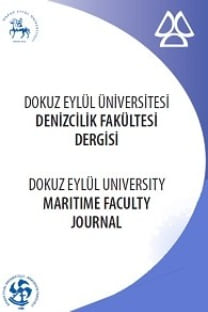DENİZ ATIKLARININ DEĞERLENDİRİLMESİ VE GERİ DÖNÜŞÜMÜ: İSTAÇ ÖRNEĞİ
Atık alım tesisleri, bertaraf, deniz atıkları, geri dönüşüm, MARPOL
RECOVERY AND RECYCLING OF MARINE WASTES: İSTAÇ CASE
Waste reception facilities, disposal, marine waste, recycling, MARPOL,
___
- Aktoprak, A., Beceren, E. ve Toröz, A. (2015). Liman işletmeciliğinde atık alım faaliyetleri “Çanakkale Liman İşletmesi Örneği”. II. Ulusal Liman Kongresi Bildiri Kitabı. İzmir.
- Ball, I. (1999). Port waste reception facilities in UK port. Marine Policy, 23 (4-5), 307-327.
- Difeto, P. M. (2010). Waste and port reception facilities, Diploma Project, School of Economics and Finance Faculty of Management Studies, Kwazulu-natal University, Durban.
- EMSA (European Maritime Safety Agency). (2012). EMSA Study on the Delivery of Ship-generated Waste and Cargo Residues to Port Reception Facilities in EU Ports. European Maritime Safety Agency Report, Copenhagen: Ramboll.
- IMO (International Maritime Organization). (2011). MARPOL Consolidated Edition. London: CPI Books Ltd.
- İSTAÇ (İstanbul Çevre Yönetimi San. ve Tic. A.Ş.). (2014a). Deniz Hizmetleri Müdürlüğü Teknik Geziler Sunumu, 2014. İstanbul.
- İSTAÇ (İstanbul Çevre Yönetimi San. ve Tic. A.Ş.). (2014b). Yıllık Aktivite Raporu, 2014. İstanbul.
- Küçük, Y.K. ve Topçu, A. (2012). Deniz taşımacılığından kaynaklanan kirlilik. Ankara Üniversitesi Çevrebilimleri Dergisi, 4(2), 75-79.
- MEPC (Marine Environment Protection Committee) (2000). Guidelines for Ensuring the Adequacy of Port Waste Reception Facilities, Circ.834.
- Özdemir, Ü. (2012). Türkiye'de gemilerden kaynaklı deniz kirliliğinin incelenmesi. Yaşam Bilimleri Dergisi, 1 (2), 373-384.
- Palabıyık, H. (2003). Waste management planning for ship generated waste, Journal of Naval Science and Engineering, 1 (2).
- Satır, T. ve Sağlamtimur, D. N. (2014). Adaptation of port waste reception facilities to ballast water treatment system: Turkish port perspective. Fresenius Environmental Bulletin, PSP 23 (11a), 2895-2898.
- Sesal, C. (2009). Rekreasyon Alanlarını Kirletici Kaynaklarının q-PCR Yöntemi ile Belirlenmesi. Marmara Üniversitesi, İstanbul.
- ÇOB (Çevre ve Orman Bakanlığı) (2010). Gemi Atıkları Yönetimi.
- http://www.cygm.gov.tr/CYGM/Files/duyurular/antep/GEMİ%20ATIKLARI%20YÖNETİM.pdf , Erişim Tarihi: 15.09.2015.
- Dries, P. V. (2012). Ship's Waste Management. International workshop on ships’ waste Euroshore – ESPO – ECSA. Antwerp Port Authority. Antwerp. http://www.euroshore.com/sites/euroshore.com/files/documents/6.%20antwerp%20port%20authority%20-%20delivery%20of%20ship-generated%20waste%20the%20antwerp%20port%20authority%20model.pdf, Erişim Tarihi: 13.02.2016.
- EB (Environmental Board) (2015). Ship-Generated Waste and Cargo Residues Reception and Handling Plan. Regulation No. 33 of the Chairman of the Management Board Dated “17” June 2015. http://www.portoftallinn.com/?dl=510, Erişim Tarihi: 15.02.2016.
- EUR. (2000). Port Reception Facilities For Ship-Generated Waste And Cargo Residues-Commission Declaration, http://eurlex.europa.eu/LexUriServ/LexUriServ.do?uri=32000L0059:EN:HTML, Erişim Tarihi: 14.07.15.
- IMO (International Maritime Organization). (2015). Convention on the Prevention of Marine Pollution by Dumping of Wastes and Other Matter. http://www.imo.org/About/Conventions/ListOfConventions/Pages/Convention-on-the-Prevention-of-Marine-Pollution-by-Dumping-of-Wastes-and -Other-Matter.aspx., Erişim Tarihi: 15.02. 2015
- İBB (İstanbul Büyükşehir Belediyesi) (2014). İBB Faaliyet Raporu 2014. http://www.ibb.gov.tr/trTR/BilgiHizmetleri/Yayinlar/FaaliyetRaporlari/Pages/2014FaaliyetRaporu.aspx, Erişim Tarihi: 02.08.2015.
- NEA (2010). Ship Generated Waste Analysis. http://www.pmgroup-global.com/news/Technical-Articles.aspx
- Erişim Tarihi: 08.10.2015.
- NEPA, (National Environmental Policy Act) (2015). Marine Pollution. http://www.nepa.gov.jm%2Fstudent%2Fresource-material%2Fpdf%2FMarine _Pollution. pdf., Erişim Tarihi: 18.06.2015.
- TBMM (Türkiye Büyük Millet Meclisi) (2013). Gündem Dışı Konuşma. 3.Yasama Yılı. 117. Birleşim. https://www.tbmm.gov.tr/develop/owa/genel_kurul.cl_getir?pEid=23998,
- Erişim Tarihi: 12.08.2015.
- Türk Loydu. (2016). Çöp Yönetim Planı. http://www.turkloydu.org/pdf-files/bayrak-devleti-hizmetleri/garbage-turkce-65duzeltme.docx, Erişim Tarihi: 25.04.2016
- UDHB (Ulaştırma, Denizcilik ve Haberleşme Bakanlığı) (2016). 1978 Protokolü ile Değişik, 1973 Tarihli Denizlerin Gemiler Tarafından Kirletilmesinin Önlenmesine Ait Uluslararası Sözleşme (MARPOL 73/78) http://imo.udhb.gov.tr/TR/19Marpol.aspx, Erişim Tarihi: 15.01.2016.
- ISSN: 1309-4246
- Yayın Aralığı: 2
- Başlangıç: 2009
- Yayıncı: Dokuz Eylul Üniversitesi Matbası
Cemile SOLAK FIŞKIN, Ersin Fırat AKGÜL, Çimen KARATAŞ ÇETİN
TÜRKİYE KONTEYNER LİMANLARINDA PAZAR YÖNLÜLÜK: İTİCİ GÜÇLER VE ENGELLER
Ceren ALTUNTAŞ VURAL, Aysu GÖÇER, D. Ali DEVECİ
TÜRKİYE LİMANCILIK SEKTÖRÜNDE KURUMSAL MANTIKLAR: KOCAELİ LİMANLARI ÖRNEĞİ
LİMAN İŞLETMELERİNDE GELENEKSEL MALİYETLEME VE FAALİYET TABANLI MALİYETLEME: BİR UYGULAMA
Reşat Karcıoğlu, Fatma Temelli
KARBON AYAK İZİNİN AZALTILMASINDA YEŞİL LİMAN UYGULAMASININ ROLÜ: MARPORT ÖRNEĞİ
İlke Koşar Danışman, Gökhan Özalp
TİCARİ LİMANLARDA HESAP VEREBİLİRLİĞİN LOJİSTİK PERFORMANSA ETKİLERİ ÜZERİNE BİR ARAŞTIRMA
Ramazan Kaynak, Şükrü Satılmış
DENİZ ATIKLARININ DEĞERLENDİRİLMESİ VE GERİ DÖNÜŞÜMÜ: İSTAÇ ÖRNEĞİ
Burak KÖSEOĞLU, Ali Cemal TÖZ, Cenk ŞAKAR
YATÇILARIN MARİNA TERCİHİNDE ALGILANAN HİZMET KALİTESİNİN MARİNA BAĞLILIĞI ÜZERİNDEKİ ETKİSİ
